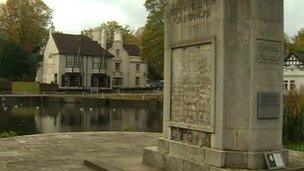Scrap metal regulations urged to combat theft
- Published

Thieves prised plaques bearing the names of 700 fallen servicemen from Carshalton war memorial
Tougher regulations on the scrap metal trade are needed to combat "soaring" theft, including that of plaques from war memorials, say town hall chiefs.
The Local Government Association (LGA) proposes measures including a ban on cash payments so sellers can be traced.
"Because of the lax regulation of the scrap metal industry, thieves can make a quick buck from unscrupulous dealers," said the LGA's Mehboob Khan.
Metal theft is estimated to cost the UK economy £770m per year.
The British Transport Police have warned is only a matter of time until the crime causes an innocent fatality.
Along the Solent, coastguard lost communications over a 36-hour period after thieves stole metal cable, disrupting its aerial signals, although the coastguard said other systems kicked in and there was no risk to the public.
In West Yorkshire, police warned thieves endangered motorists after stealing street lighting cable, plunging a dual carriageway into darkness.
More than £200,000-worth of cable was stolen from the A63 link road between junction 45 of the M1 and Leeds.
In the last year six people have died in the act of stealing power cables, according to the Energy Networks Association (ENA).
In the early hours of Saturday a man was taken to hospital with 60% burns after an explosion at a substation Oldbury, West Midlands.
The man, thought to be an Eastern European metal thief, is in a critical condition.
The LGA proposals also include installation of CCTV with automatic number plate recognition in scrapyards, and the requirement that dealers keep a log of sellers' details.
They also want scrapyards to renew their licences every year.
Mr Khan, chairman of the LGA's safer and stronger communities board, said: "If we are to clamp down on thieves causing chaos and heartbreak by plundering metal for a quick profit, we need to give councils power to ensure the industry is properly run."
'Beyond contempt'
Prime Minister David Cameron has called metal theft, particularly from war memorials, "an absolutely sickening and disgusting crime".
The War Memorials Trust estimates one monument is vandalised per week for its bronze, copper or other metal.
"It is utterly shameless and beyond contempt that anyone would desecrate the memory of those who have given their lives for their country in this way," said Mr Khan.
Watch: Thieves make off with stolen copper cable
"The value of these metal plaques far surpasses any price these heartless thieves will get for the metal.
"Often they are the only remaining source of information on people from an area who have paid the ultimate price while serving their country."
Legislation has the backing of the energy industry.
David Smith, chief executive of the ENA, said: "With 700 incidents of metal theft against the energy networks each month, addressing the damage caused by thieves has become a daily challenge.
"The current legislation is unfit for purpose. Only by stopping the means of benefiting from the crime can we stop the mindless acts of criminals."
High global prices for metals - especially copper - are thought to be driving the spree of thefts.
The government has said it is working with the Association of Chief Police Officers (Acpo) to come up with a plan to tackle the problem.
- Published2 November 2011
- Published1 November 2011
- Published8 October 2011
- Published3 October 2011
- Published28 September 2011